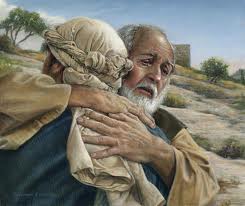HE WAS LOST, AND IS FOUND
(A biblical reflection on the 4th Sunday of Lent, Year C – March 10, 2013)
Gospel Reading: Luke 15:1-3,11-32
First Reading: Josh 5:9-12; Psalms: Ps 34:2-7; Second Reading: 2Cor 5:17-21
Scripture Text
Now the tax collectors and sinners were all drawing near to hear Him. And the Pharisees and the scribes murmured, saying, “This man receives sinners and eats with them.”
So He told them this parable: “There was a man who had two sons; and the younger of them said to his father, ‘Father, give me the share of property that falls to me.’ And he divided his living between them. Not many days later, the younger son gathered all he had and took his journey into a far country, and there he squandered his property in loose living. And when he had spent everything, a great famine arose in that country, and he began to be in want. So he went and joined himself to one of the citizens of that country, who sent him into his fields to feed swine. And he would gladly have fed on the pods that the swine ate; and no one gave him anything. But when he came to himself he said, ‘How many of my father’s hired servants have bread enough and to spare, but I perish here with hunger! I will arise and go to my father, and I will say to him, “Father, I have sinned against heaven and before you; I am no longer worthy to be called your son; treat me as one of your hired servants.”’ And he arose and came to his father. But while he was yet at a distance, his father saw him and had compassion, and ran and embraced him and kissed him. And the son said to him, ‘Father, I have sinned against heaven and before you; I am no longer worthy to be called your son.’ But the father said to his servants, ‘Bring quickly the best robe, and put it on him; and put a ring on his hand, and shoes on his feet; and bring the fatted calf and kill it, and let us eat and make merry; for this my son was dead, and is alive again; he was lost, and is found.’ And they began to make merry.
“Now his elder son was in the field; and as he came and drew near to the house, he heasrd music and dancing. And he called one of the servants and asked what this meant. And he said to him, ‘Your brother has come, and your father has killed the fatted calf, because he has received him safe and sound.’ But he was angry and refused to go in. His father came out and entreated him, but he answered his father, ‘Lo, these many years I have served you, and I never disobeyed your command; yet you never gave me a kid, that I might make merry with my friends. But when this son of yours came, who has devoured your living with harlots, you killed for him the fatted calf!’ and he said to him, ‘Son, you are always with me, and all that is mine is yours. It was fitting to make merry and be glad, for this your brother was dead, and is alive; he was lost, and is found.’” (Lk 15:1-3,11-32 RSV)
How important – and how difficult – that we understand our poverty before God! We do not like to admit that we need to be saved from ourselves. It can seem ironic that, in His desire to draw us closer, God will even allow us to resist Him and turn away. He knows that this may be the only way we will learn how much we need Him. The wonder is that when we do “come to our senses,” He always welcomes us home.
In the parable, the father gave his son all that he requested, knowing he did not yet know how to handle it. The man could only hope that his son would eventually return to him and accept his care. When the son did return – poverty stricken, having lived in conditions far worse than his father’s servants – this is exactly what happened. By stepping outside of the circle of his father’s protection, he subjected himself to far more pain and isolation than he expected.
We can be so like this young man! We do not like to acknowledge our poverty or our opposition to God. We “strike out on our own,” thinking all will be well, only to return to God later, begging for His touch. God allows this to occur because He wants us to know the poverty of life apart from Him. He wants us to know that only by His grace can we have freedom and peace.
Every time we separate ourselves from God and go our own way, we see what a life without His mercy is like. As we run out of our resources – spiritual, emotional, physical – we get a glimpse of the judgment we deserve. Let us turn back to Him so that we can rejoice in our Father’s embrace as He cleanses us with the blood of Jesus and fills us with His Holy Spirit.
Short Prayer: Heavenly Father, we come to You today, weak and in need of Your life. Purify our hearts, fill us with the Holy Spirit, embrace us with Your love. You are wisdom and love, and only You can fill our needs. Amen.



